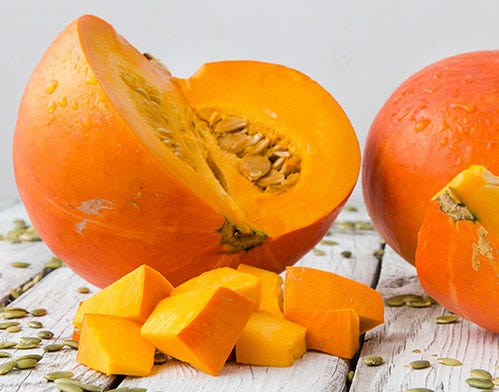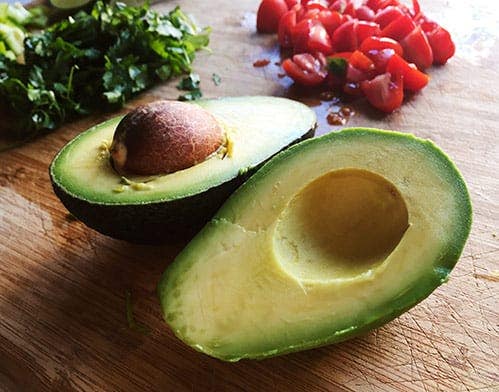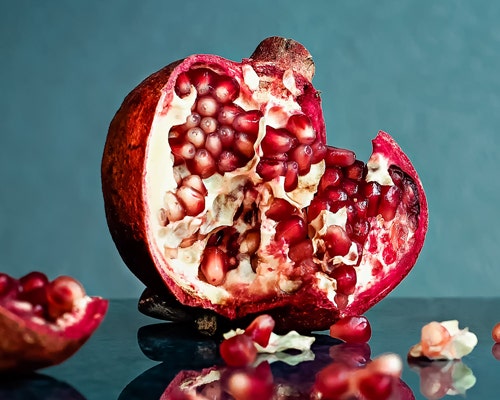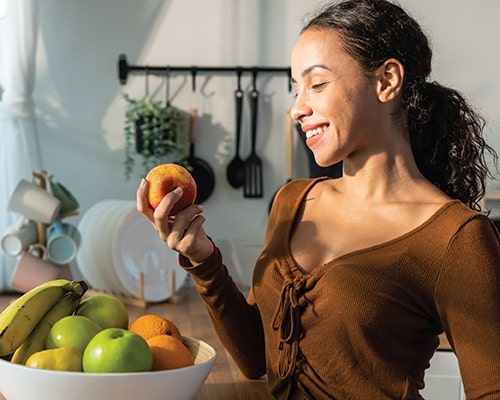The Incredible, Edible Pumpkin
- 10/2/16

For people who love the fall season and the plethora of pumpkins associated with it, devouring every bit of pumpkin-flavored goodie available doesn’t take much, if any, convincing. While many of the season’s pumpkin treats are loaded with sugar, refined carbohydrates or artificial ingredients, all-natural pumpkin is full of potassium, iron, and magnesium, and is bursting with incredible health benefits. Consider putting the syrupy sweet pumpkin spiced latte aside, and take a detour to the natural foods section or the nearest farmer’s market to pick out a few of autumn’s hottest vegetable!
From head to toe, pumpkin offers a wide variety of wellness benefits for the entire body. According to the Mayo Clinic, pumpkin derives its rich orange color from an abundance of beta-carotene, which the body converts to vitamin A. Perhaps the most notable characteristic of beta-carotene is its possible role in cancer prevention, supported by over 200 research studies. To name just a few, a University of Washington study found a strong correlation with eating foods rich in beta-carotene and a reduced risk of cervical cancer. Swiss research found beta-carotene to have a protective effect on the throat, intestines, lungs, colon and bladder. High levels of vitamin A can also promote a strong immune system, with pumpkin oil reported by CNN to also help fight several kinds of bacterial and fungal infections.
Beyond its overall body-protective properties, beta-carotene is an essential nutrient for eye health, aiding the retina in absorbing and processing light. Just one cup of pumpkin contains more than the recommended daily amount of vitamin A. Further, pumpkin contains two other nutrients advantageous to optical health, lutein and zeaxanthin. These antioxidants have been suggested to help maintain sharp vision and promote healthy eyes by aiding in both the prevention and delayed onset of cataracts and macular degeneration.
The antioxidant benefits in pumpkin go past the eyes and extend to the skin, according to the Journal of Dermato-Endocrinology. Beta-carotene has been found to possess photo-protective, anti-aging properties. Reports by CNN show that vitamin A initiates the skin’s cell regeneration process and increases collagen production – resulting in a smoother, younger-looking appearance. The skin smoothing benefits of pumpkin can even be obtained by using it as a rejuvenating facial mask!
Besides antioxidants and vitamins, pumpkin is also rich in fiber. The Journal of the American Medical Association published a Harvard study which showed that consuming a diet high in fiber offered a 40 percent reduced risk of heart disease, compared to a low-fiber diet. As fiber is known to bind to LDL (“bad”) cholesterol before it has a chance to be absorbed by the body, it aids in protection of the heart. Pumpkin’s high fiber content also curbs hunger and promotes satiety to help promote weight-loss, and thus also contributes to cardiovascular health. To further promote heart health, pumpkin seeds are chock full of natural phytoestrogens, known to prevent hypertension, stabilize blood pressure, and even improve the effects of certain medications, according to a study published in the Pharmacological Research journal.
For those struggling with insomnia, look no further than pumpkin seeds, which are rich in the sleep-prompting amino acid tryptophan. Pumpkin seed oil has even more benefits for men, including increased urination and improved bladder comfort, especially for men with an enlarged prostate. A study in the Urology Internationalis journal found that the oil furthered supported the prostate by inhibiting unhealthy prostate growth.
With so many health benefits, pumpkin is undoubtedly an underrated superfood. Pumpkin even has very little waste – its flowers, leaves, flesh and seeds are all edible, according to the Mayo Clinic. There is a distinct difference in pumpkins grown to be eaten versus carved. The outer appearance may be similar, but the former variety are smaller, sweeter and contain less water than the larger, stringier type intended for decorations.
While pumpkin pie is probably one of the most common recipes utilizing pumpkin, its versatility goes way beyond sweets. For extra convenience, choose 100 percent organic pumpkin in a can (not canned pumpkin pie mix, which has added sugar) to create smoothies, soups, stews and to add to salads. Canned or mashed cooked pumpkin is a hearty addition to add a punch of nutrition to pancakes, muffins or breads, and can even serve as a substitute for butter. For taste, add a pinch of cinnamon or nutmeg if desired. Pumpkin is also a delicious topping to low-fat yogurt. It can even be enjoyed simply sautéed, or cut into wedges with olive oil and light seasoning, and roasted in the oven.
So go ahead and enjoy the incredible, edible pumpkin!
This information is intended for educational and informational purposes only. It should not be used in place of an individual consultation or examination or replace the advice of your health care professional and should not be relied upon to determine diagnosis or course of treatment.
From head to toe, pumpkin offers a wide variety of wellness benefits for the entire body. According to the Mayo Clinic, pumpkin derives its rich orange color from an abundance of beta-carotene, which the body converts to vitamin A. Perhaps the most notable characteristic of beta-carotene is its possible role in cancer prevention, supported by over 200 research studies. To name just a few, a University of Washington study found a strong correlation with eating foods rich in beta-carotene and a reduced risk of cervical cancer. Swiss research found beta-carotene to have a protective effect on the throat, intestines, lungs, colon and bladder. High levels of vitamin A can also promote a strong immune system, with pumpkin oil reported by CNN to also help fight several kinds of bacterial and fungal infections.
Beyond its overall body-protective properties, beta-carotene is an essential nutrient for eye health, aiding the retina in absorbing and processing light. Just one cup of pumpkin contains more than the recommended daily amount of vitamin A. Further, pumpkin contains two other nutrients advantageous to optical health, lutein and zeaxanthin. These antioxidants have been suggested to help maintain sharp vision and promote healthy eyes by aiding in both the prevention and delayed onset of cataracts and macular degeneration.
The antioxidant benefits in pumpkin go past the eyes and extend to the skin, according to the Journal of Dermato-Endocrinology. Beta-carotene has been found to possess photo-protective, anti-aging properties. Reports by CNN show that vitamin A initiates the skin’s cell regeneration process and increases collagen production – resulting in a smoother, younger-looking appearance. The skin smoothing benefits of pumpkin can even be obtained by using it as a rejuvenating facial mask!
Besides antioxidants and vitamins, pumpkin is also rich in fiber. The Journal of the American Medical Association published a Harvard study which showed that consuming a diet high in fiber offered a 40 percent reduced risk of heart disease, compared to a low-fiber diet. As fiber is known to bind to LDL (“bad”) cholesterol before it has a chance to be absorbed by the body, it aids in protection of the heart. Pumpkin’s high fiber content also curbs hunger and promotes satiety to help promote weight-loss, and thus also contributes to cardiovascular health. To further promote heart health, pumpkin seeds are chock full of natural phytoestrogens, known to prevent hypertension, stabilize blood pressure, and even improve the effects of certain medications, according to a study published in the Pharmacological Research journal.
For those struggling with insomnia, look no further than pumpkin seeds, which are rich in the sleep-prompting amino acid tryptophan. Pumpkin seed oil has even more benefits for men, including increased urination and improved bladder comfort, especially for men with an enlarged prostate. A study in the Urology Internationalis journal found that the oil furthered supported the prostate by inhibiting unhealthy prostate growth.
With so many health benefits, pumpkin is undoubtedly an underrated superfood. Pumpkin even has very little waste – its flowers, leaves, flesh and seeds are all edible, according to the Mayo Clinic. There is a distinct difference in pumpkins grown to be eaten versus carved. The outer appearance may be similar, but the former variety are smaller, sweeter and contain less water than the larger, stringier type intended for decorations.
While pumpkin pie is probably one of the most common recipes utilizing pumpkin, its versatility goes way beyond sweets. For extra convenience, choose 100 percent organic pumpkin in a can (not canned pumpkin pie mix, which has added sugar) to create smoothies, soups, stews and to add to salads. Canned or mashed cooked pumpkin is a hearty addition to add a punch of nutrition to pancakes, muffins or breads, and can even serve as a substitute for butter. For taste, add a pinch of cinnamon or nutmeg if desired. Pumpkin is also a delicious topping to low-fat yogurt. It can even be enjoyed simply sautéed, or cut into wedges with olive oil and light seasoning, and roasted in the oven.
So go ahead and enjoy the incredible, edible pumpkin!
This information is intended for educational and informational purposes only. It should not be used in place of an individual consultation or examination or replace the advice of your health care professional and should not be relied upon to determine diagnosis or course of treatment.





